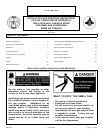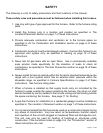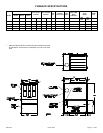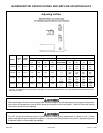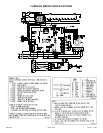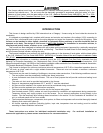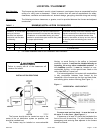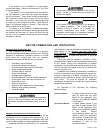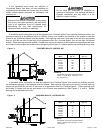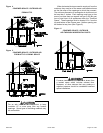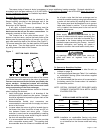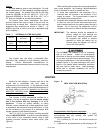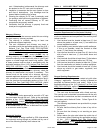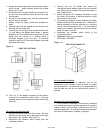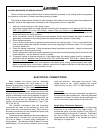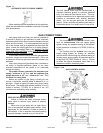
If the furnace is to be installed in a crawl space,
consult local codes. (Use of a concrete pad 1" to 2" thick
is recommended.)
If the furnace is to be suspended from the ceiling, it
will be necessary to use steel pipe straps around each
end of the furnace. These straps should be attached to
the furnace with sheet metal screws and to the rafters
with bolts. The furnace may also be suspended by using
an angle iron frame bolted to the rafters. (See Table on
page 3 for size and weight of furnace.) Care must be
taken to allow for service access.
If a furnace is to be installed in a residential garage,
it must be installed so the burners and the ignition source
are located not less than 18" above the floor and the
furnace must be located or protected to avoid physical
damage by vehicles.
Do not place combustible material on the furnace
jacket. Failure to comply with this warning will
create a fire hazard.
This furnace is not watertight and is not designed
for outdoor installation. This furnace shall be
installed in such a manner as to protect the
electrical components from water. Outdoor
installation would lead to a hazardous electrical
condition and to premature furnace failure.
AIR FOR COMBUSTION AND VENTILATION
Contaminated Combustion Air:
This furnace is not to be installed in a structure
defined as having contaminated combustion air. Allowing
exposure to substances containing chlorine or fluoride
could harm the furnace and void the warranty.
Substances to avoid include, but are not limited to:
• Permanent wave solutions
• Chlorinated waxes and cleaners
• Chlorine based swimming pool chemicals
• Water softening chemicals
• De-icing salts or chemical
• Carbon tetrachloride
• Halogen type refrigerants
• Cleaning solvents (such as perchloroethylene)
• Printing inks, paint removers, varnishes, etc.
• Hydrochloric acid
• Cements and glues
• Antistatic fabric softeners for clothes dryers
• Masonry acid washing materials
• Unrefined gases
Contaminated combustion air may cause premature
failure of the heat exchanger that may lead to a
hazardous condition and/or bodily harm, or loss of
life.
Adequate Ventilation and Combustion Air:
This section is provided to give guidelines for the
introduction of air for ventilation and combustion air. The
total quantity of air provided to the installation area must
equal the requirements of all gas appliances in the area.
Adequate facilities for providing air for combustion
and ventilation must be provided in accordance with the
latest edition of the National Fuel Gas Code ANSI
Z223.1/NFPA54 or CSA B149.1 Natural Gas and Propane
Installation Codes, or applicable provisions of the local
building codes.
The furnace shall be installed in a location in which
the facilities for ventilation permits satisfactory combustion
of gas, proper venting and maintenance of ambient
temperature at safe limits under normal conditions of use.
The furnace shall be located so as not to interfere with
proper circulation of air.
In addition to air needed for combustion, ventilation in
the form of process air must be provided as required for:
cooling of equipment or material, controlling dew point,
heating, drying, oxidation or dilution, safety exhaust and
odor control. Air must be supplied for ventilation,
including all air required for comfort and proper working
conditions for personnel.
For purposes of this instruction the following
definitions apply:
Confined Space: A space whose volume is less
than 50 cubic feet per 1000
Btu/hr of the aggregate input
rating of all appliances installed
in that space.
Unconfined Space: A space whose volume is not
less than 50 cubic feet per 1000
Btu/hr of the aggregate input
rating of all appliances installed
in that space. Rooms
communicating directly with the
space in which the appliances
are installed, through openings
not furnished with doors, are
considered a part of the
unconfined space.
20571201 Issue 0527 Page 8 of 28



